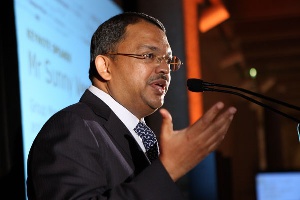Olam has announced the opening of entries for the second International Olam Prize for Innovation in Food Security, setting off another hunt for potentially ground-breaking scientific research into food security which could revolutionise the agricultural industry.
First launched in 2014 by global agri-business leader, Olam International, in conjunction with its highly respected scientific partner, Agropolis Fondation, the Olam Prize for Innovation in Food Security, recognises an innovative scientific research project for its potential impact on the availability, affordability, accessibility and adequacy of food.
The winning research project for the 2016/2017 edition will receive US$50,000 unrestricted funding to support its further development. The laureates may also have the opportunity to work with Olam to develop the practical application of their innovation with the company, whose expertise in agricultural supply chain spans 47 products in 70 countries.
Mr. Sunny Verghese, Co-Founder and Group CEO at Olam, said: “Despite being a global agri-business, we do not have all the answers as to how we are going to feed more than 1 billion extra people by 2030.
But there are research teams across the world that are uncovering new insights and techniques every day.
Through this prize we hope to support and scale-up a breakthrough innovation that will ultimately prevent people going to bed hungry without depleting our natural resources.”
Applications are welcomed from research projects in nutrition science, plant science, soil science, agricultural sciences or other field of scientific research impacting food security.
Academic or research institutions, civil society organisations and the private sector can submit research based anywhere in the world, focused on innovation for food security in developed and/or developing countries and any part of the agricultural supply chain.
The Olam Prize will be judged by an independent jury of 12 experts and awarded in conjunction with the Agropolis Louis Malassis International Scientific Prizes for Agriculture and Food. The deadline for submission of applications is 11:59pm (CET) on January 25, 2017.
Winner of the inaugural Olam International Prize for Innovation in Food Security in 2015, SRI International Network and Resources Center (SRI-Rice), was rewarded for its work on the System of Rice Intensification (SRI), a game-changing innovation that enhances productivity of rice paddy, water conservation, livelihoods, soil health, and crop resilience to climate stress.
With proceeds from the Olam Prize, SRI-Rice has been further developing an international network that connects researchers in 45 countries to share learning, access research papers, and collaborate across borders.
The spread and utilisation of SRI ideas has been extended to 18 to 20 million farmers on about 6 million hectares worldwide. Yield improvements average 1 to 2 tons/ha, using less water, having lower costs, and with more resilience to climate stresses.
Mr. Pascal Kosuth, Director of Agropolis Fondation and member of the Jury of both the Olam Prize and Louis Malassis International Scientific Prizes for Agriculture and Food said: “SRI is a great example of an innovation taken up at the grassroots-level achieving scale.
“Awarding the Olam Prize to the SRI effort is a fitting tribute to an initiative that is having an impact on the quality and quantity of this staple food crop grown by small-scale farmers around the world. Now the search begins for the next crop of scientists doing ground-breaking research in this field and who could be deserving of the Prize.”
The Olam Prize is one of 4 initiatives launched for Olam’s 25th anniversary in 2014, which also include a scholarship programme, a foundation and the Building Sustainable Futures Forum, which was held on September 15 2016. A focal point of the Forum, was the launch of the Global Agri-business Alliance (GAA) in which leading agri-businesses have come together to collectively tackle environmental and social issues, with a particular focus on SDG 2: “End hunger, achieve food security and promote sustainable agriculture”.
Business News of Friday, 21 October 2016
Source: Daily Guide

















